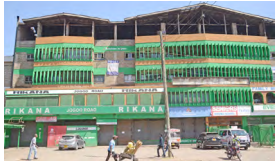
For close to three
decades, residents of the estates
along Nairobi’s Jogoo Road have
known a retailer that defied the industry challenges to stay afloat despite
having only two outlets.
However, the tide has now changed as Rikana Supermarket, one of Nairobi’s oldest retailers shut down operations after 27 years.
Established in 1998, and with only two branches, Rikana was among the first homegrown stand-alone supermarkets in the city to compete with international brands, serving generations of loyal customers.
Its closure marks the end of an era and has left many reflecting on its long history and the broader challenges facing Kenya’s retail sector.
In its prime, the chain expanded to an additional store that was located in Donholm.
In an interview with some of the staff of the retailer before its eventual closure, they disclosed to the Star, that they are in the process of disposing off the remaining stock.
“Right now everything on the shelves is discounted we are even making home deliveries to ensure we clear everything because we were told this is the last month we will be working here,” the staff who sought anonymity told this writer.
Despite its initial success, Rikana began facing challenges in the late 2010s as uncertainties gripped the fast goods retail industry following the collapse of industry giants Tuskys, Nakumatt and major exit by international brands.
The stock of goods on its shelves dropped significantly as it struggled to stay afloat.
The Kenyan retail market has grown increasingly competitive, with the entry of global chains and the rise of e-commerce reshaping consumer habits.
Additionally, the opening up of local competitors such as Naivas and Quickmart who aggressively expanded their footprint along the same area, offered customers a more modern shopping experience.
Rikana’s troubles deepened during the COVID-19 pandemic, which disrupted supply chains and reduced consumer spending.
While some retailers adapted by investing in online platforms, Rikana struggled to keep pace. Our source revealed that delayed payments and shrinking stock began to emerge, signalling financial distress.
The final blow came in late 2024 when rising operational costs and mounting debts forced the management to make the difficult decision to cease operations.
On December 28, 2024, Rikana closed its doors.
Our efforts to reach the management of the retailer were unsuccessful as they promised to get back but were yet to reach out by the time of publishing.
News of Rikana’s closure has been met with an outpouring of nostalgia and sadness from residents of Makongeni, Mbotela, Kaloleni and the surrounding estates.
“I have been here and did my shopping, though there is nothing on the shelves but I managed to get my kids slippers for only Sh40,” said Beryl Atieno a resident of Makongeni.
Rikana’s downfall is a stark reminder of the challenges facing Kenya’s retail sector. Analysts point to a combination of factors, including poor financial management, the inability to adapt to changing market trends, and stiff competition from both local and international players in the downfall of most retail outlets.
The rise of e-commerce
platforms has significantly altered
shopping habits.













